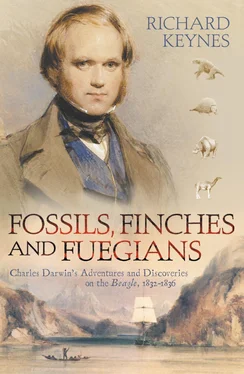Charles set to work on the reproductive particles of Flustra and other marine animals, and to his great excitement confirmed Grant’s observation that the eggs of Flustra were coated with fine cilia, hairlike vibrating organs whose coordinated movements endowed the ova with some degree of motility. He also noted that the ‘sea peppercorns’ often found attached to old shells were not as previously assumed buttons of seaweed, but were the eggs of the marine leech Pontobdella muricata . This he duly reported in his first scientific paper, presented in a talk to the Plinian Society on 27 March 1827; but he had been seriously put out when three days earlier Grant read a long memoir to the Wernerian Society that included his pupil’s findings without any proper acknowledgement of their source. What had happened was later described by Charles’s daughter Henrietta:
When he was at Edinburgh he found out that the spermatozoa [ova] of things that grow on seaweed move. He rushed instantly to Prof. Grant who was working on the same subject to tell him, thinking, he wd be delighted with so curious a fact. But was confounded on being told that it was very unfair of him to work at Prof. G’s subject and in fact that he shd take it ill if my Father published it. This made a deep impression on my father and he has always expressed the strongest contempt for all such little feelings – unworthy of searchers after truth. 20
At around the same time, as Charles recalled long afterwards, he had a significant conversation with Grant:
He one day, when we were walking together, burst forth in high admiration of Lamarck and his views on evolution. I listened in silent astonishment, and as far as I can judge, without any effect on my mind. I had previously read the Zoonomia of my grandfather, in which similar views are maintained, but without producing any effect on me. Nevertheless it is probable that the hearing rather early in life such views maintained and praised may have favoured my upholding them under a different form in my Origin of Species . At this time I admired greatly the Zoonomia ; but on reading it a second time after an interval of ten or fifteen years, I was much disappointed, the proportion of speculation being so large to the facts given. 21
When in 1793 Jean Baptiste Pierre Antoine de Monet de Lamarck was appointed as Professor of the ‘inferior animals’ in Paris, he earned good marks for renaming them in a less uncomplimentary fashion as ‘invertebrates’, i.e. animals without backbones. He also came up with new and valid reasons for believing in the evolution of new species. But he then spoiled his case by endowing all animals with a special power to interact directly with their environment and acquire ever greater complexity or perfection, supposing for example that the length of a giraffe’s neck was the result of the animal constantly reaching up for food, or that the length of an anteater’s nose and loss of its teeth resulted from perpetual sniffing into anthills, and was inherited over many generations. In the absence of any good evidence for such an inheritance of acquired characteristics, the term ‘Lamarckian’ soon had pejorative connotations. The occasion to which Charles referred was possibly the first when Grant revealed his extreme views on transmutation in invertebrates, and metamorphoses in extinct fossils. At the end of 1827 Grant became the first Professor of Zoology and Comparative Anatomy at University College London, * and his strongly Lamarckian approach was more widely disseminated. He held this post until his retirement in 1874, and though he was reported by Charles’s friend Frederick William Hope in 1834 to be ‘working away at the Mollusca & Infusoria publishing at a great rate’, in 1867 he was still teaching a defunct 1830s zoology in a frayed swallow-tail coat. Charles later noted that ‘he did nothing more in science – a fact which has always been inexplicable to me’. Grant’s excessively radical attitude, coupled with the disillusionment stemming from their falling out that March, may help to explain why their subsequent relations were never close, and there is no suggestion that Charles was ever subjected to the intimate approaches from Grant that may eventually have led to the nervous breakdown suffered by another of his students, John Coldstream.
Robert Darwin was far from pleased with Charles for giving up medicine, and told him angrily, and as Charles thought somewhat unjustly, ‘You care for nothing but shooting, dogs and rat-catching and you will be a disgrace to yourself and all your family.’ 22 After careful consideration, Robert decided that the only alternative for which there were several precedents in the Darwin and Wedgwood families would be for Charles to go up to Cambridge to take an ordinary Arts degree as the first step towards becoming an Anglican clergyman. In order to fulfil in due course the requirements for entry into the university, he had to brush up the Latin and Greek that he was supposed to have learnt at school, and a private tutor was therefore engaged for the last eight months of 1827. The period was not a very happy one for Charles, though he managed to escape to Uncle Josiah Wedgwood’s house at Maer Hall in Staffordshire, seven miles from Stoke-on-Trent, for at least the start of the shooting season, and made his first and only visit to France to collect his youngest Wedgwood cousins from Paris. But he did not record whether he also fitted in a visit to Cuvier’s famous Musée d’Histoire Naturelle.
Charles duly matriculated at Christ’s College, Cambridge, in January 1828. Here he quickly fell in with a new circle of young men from his own background and sharing his own tastes, one of whom described him at the time as ‘rather thick set in physical frame & of the most placid, unpretending & amiable nature’. Some years later, Charles advised his eldest son William at school:
You will surely find that the greatest pleasure in life is in being beloved; & this depends almost more on pleasant manners, than on being kind with grave & gruff manners. You are almost always kind & only want the more easily acquired external appearance. Depend upon it, that the only way to acquire pleasant manners is to try to please everybody you come near, your school-fellows, servants & everyone. Do, my own dear Boy, sometimes think over this, for you have plenty of sense & observation. 23
Charles’s own amiability and good relations with the rest of the world at every level were always among his most outstanding characteristics, and he had a true genius for friendship.
His new acquaintances included a number of schoolmates from Shrewsbury, and his cousin Hensleigh Wedgwood from Staffordshire, who had earlier seen a lot of Charles’s brother Erasmus in Cambridge. By far his closest friend to begin with was a cousin from the other side of the family, William Darwin Fox, the only son of Robert Darwin’s cousin Samuel Fox, who was then in his third year at Christ’s and due to become a parson in Cheshire. William Darwin Fox’s abiding passion, just as Charles’s had been in his childhood, was for the collection of exotic natural history specimens that filled every cubic inch of his rooms. He took great pleasure in shooting and riding, and kept two dogs named Fan and Sappho at Christ’s, about whose exploits, matching that of Charles’s Mr Dash at Shrewsbury, they had a regular correspondence. Fox encouraged Charles to take an interest in both art and music, and together they visited print shops and the Fitzwilliam Museum, and attended concerts of choral works in college chapels. Charles later joined a musical set headed by another good friend, John Maurice Herbert. 24 They went regularly to King’s College chapel to hear the anthem sung, and occasionally Charles hired the choristers to perform in his rooms. But as Herbert soon discovered, and as he himself freely admitted, Charles’s pleasure in listening was not in fact accompanied by a good musical ear. The interests of the group were wide-ranging, and extended at one time to the formation of the ‘Glutton’ or ‘Gourmet’ Club at which they dined when not eating in hall, and consumed a range of animals that did not usually appear on the menu. The club was finally brought to an end by an attempt to eat an old brown owl whose flavour was considered by all to have been ‘indescribable’. One wonders what the club would have made of some of the weird dishes later consumed in an experimental spirit by Charles on the Beagle .
Читать дальше












